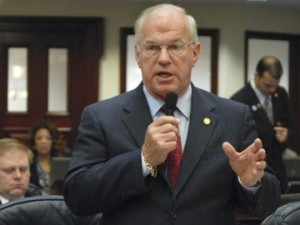Florida’s new restrictions on judicial bypass for parental notification of abortion now in effect
State Rep.
Jul 31, 2020123.1K Shares2.1M Views
As of Saturday, young women in Florida face a harder time obtaining a judicial bypassaround the state’s parental notification of abortion law.
Most state parental notice laws provide a judicial bypass as a way of protecting young women from possible harm. Providing an effective way to bypass the law helps young women who fear they will be abused or kicked out of their homes if a parent finds out she was seeking an abortion.
According to Samantha Gordon of NARAL Pro-Choice America, judicial bypasses are “pretty standard provisions.”
“Of the 44 states that have a law on the books,” she says, “all but two have judicial bypass provisions.”
Florida’s new rules limit access to this already restricted provision. Opponents of Florida’s law have said it “endangers the health of young women.”
The new restrictions require that young women seeking a bypass have access only to the circuit court in which they reside. Before, young women could appeal to any circuit court in the state. Many argued the restriction could present a violation of privacy —especially for young women living in small towns. (Currently, this strict provision is only law in North Dakota.) Sen. Arthenia Joyner, D-Tampa, explained during debate over the billthat “in small judicial circuits, the judge knows the parent and the kid.”
The American Civil Liberties Union of Florida pointed outthat the bill added new language requiring judges to lecture women seeking a bypass.
“According to the bill,” a press release from the group explains, “judges must ask questions of the applicant that determine if she ‘has the ability to assess both the immediate and long-range consequences of [her] choices.’”
Another provision limits the way in which judges and courts consider each possible bypass — barring judges from considering the financial implications of delivering, caring for and raising a child, should the woman choose not to terminate her pregnancy. The ACLU argues that this particular provision “ties judges’ hands” because it restricts them from considering “any inability to adequately or safely provide for a child as a reason to grant a waiver of parental notice.”
State Sen. Alan Hayes, R-Umatilla (Pic by Senator Hays, via flsenate.gov)
The sponsor of the bill in the state Senate, Alan Hays, R-Umatilla, said the bill was aimed at adults “counseling minors to have abortions.”He told his colleagues that further restrictions would stop instances of young women “judge-shopping” throughout the state, comparingthe process by which a minor could choose a judge for bypass to Florida’s “pill mill” problem.
Those opposed to the bill, which included members of both parties, argued that it would violate a young woman’s confidentiality and would extend the waiting period for a bypass. Abortion rights advocates have argued that extending the waiting period for an abortion presents medical as well as legal problems.
Sen. Ellyn Bogdanoff, R-Fort Lauderdale, was among a handful of Republican state legislators who opposed to the bill.
“When somebody needs a judicial bypass, it is because of a circumstance in which they actually need a judicial bypass,” she said, “whether it be privacy, rape, incest — who knows what the issue is. And in small communities, and even in communities like Broward and Palm Beach County, the courthouse is a small community. Everybody knows one another.”
Bogdanoff also confronted Hays’ claim that young girls are “shopping” for a judge to grant them a bypass.
“We are not talking about shipping somebody from Miami to Jacksonville so that they can ‘judge-shop,’” she said. “I know that’s what a lot of people think they are going to do is ‘judge-shop.’ There are very, very few minors that look for the judicial bypass, but when they do, it is because of serious concerns. In order to protect the privacy of these young women and make sure that they are not at risk when they go home, I don’t think it is unreasonable for us to accept this amendment.”
Another controversial aspect of the law has also been it’s history in the Florida Legislature. One of the last policy-makers to introduce this measure is married to the House sponsor of the law that is now in effect.
State Rep. Kelli Stargel, R-Lakeland, is the wife of John Stargel, who introduced a similar measure as a state senator in 2006. According to a LifeNews.com article, John Stargel has long been interested in giving judges less latitude in granting parental notification waivers, as well as more time in granting them.
John Stargel is now a circuit court judge. That means he is among a number of judges to whom young women can appeal in order to get a waiver for a parental notification needed to obtain an abortion.

Rhyley Carney
Reviewer
Latest Articles
Popular Articles
